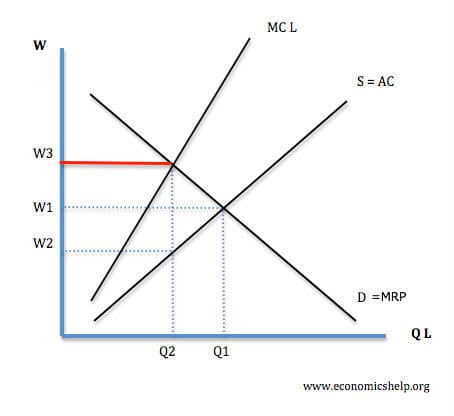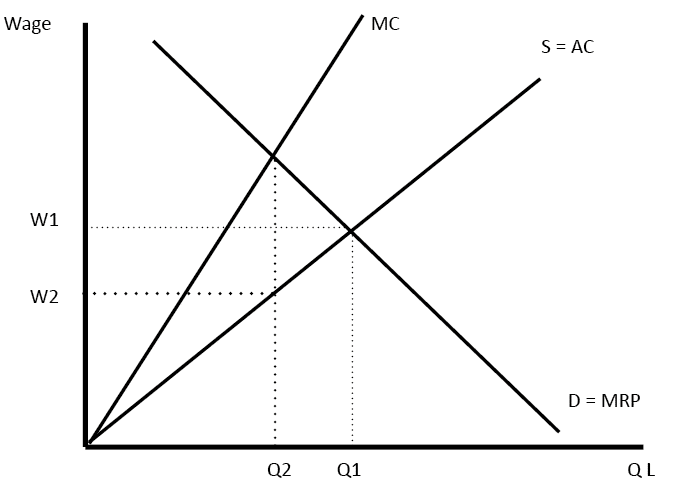Definition of Monopsony
- A monopsony occurs when a firm has market power in employing factors of production (e.g. labour).
- A monopsony means there is one buyer and many sellers.
- It often refers to a monopsony employer – who has market power in hiring workers.
- This is a similar concept to monopoly where there is one seller and many buyers.
Monopsony in Labour Markets
An example of a monopsony occurs when there is one major employer and many workers seeking to gain employment.
If there is only one main employer of labour, then they have market power in setting wages and choosing how many workers to employ.
Examples of monopsony in labour markets
- Coal mine owner in town where coal mining is the primary source of employment.
- The government in the employment of civil servants, nurses, police and army officers.
Diagram of monopsony
- In a competitive labour market, the equilibrium will be where D=S at Q1, W1.
- However, a monopsony can pay lower wages (W2) and employ fewer workers (Q2)
Profit Maximisation for a Monopsony
- The marginal cost of employing one more worker will be higher than the average cost – because to employ one extra worker the firm has to increase the wages of all workers.
- To maximise the level of profit, the firm employs Q2 of workers where the marginal cost of labour equals the marginal revenue product MRP = D
- In a competitive labour market, the firm would be a wage taker. If they tried to pay only W2, workers would go to other firms willing to pay a higher wage.
Minimum wage in a monopsony
In a monopsony, a minimum wage can increase wages without causing unemployment.

- A monopsony pays a wage of W2 and employs Q2.
- If a minimum wage was placed equal to W1, it would increase employment to Q1.
- A minimum wage of W3 would keep employment at Q2.
Monopsony in the real world
Even if a firm is not a pure monopsony, it may have a degree of monopsony power, due to geographical and occupational immobilities, which make it difficult for workers to switch jobs and find alternative employment.
For example, there are several employers who might employ supermarket checkout workers. However, in practice, it is difficult for workers to switch jobs to take advantage of slightly higher wages in other supermarkets. There is a lack of information and barriers to moving jobs. Therefore, although there are several buyers of labour, in practice the big supermarkets have a degree of monopsony power in employing workers.
Monopsony and the gig economy
The gig economy refers to recent trends towards self-employment and very flexible labour practises. In practice, workers in the gig economy can easily face a monopsony employer. For example, Uber drivers have little control over rates of pay and have to meet strict criteria from Uber. In theory, they could work elsewhere but in practise it is difficult to replicate that job.
Problems of monopsony in labour markets
- Monopsony can lead to lower wages for workers. This increases inequality in society.
- Workers are paid less than their marginal revenue product.
- Firms with monopsony power often have a degree of monopoly selling power. This enables them to make high profits at the expense of consumers and workers.
- Firms with monopsony power may also care less about working conditions because workers don’t have many alternatives to the main firm.
Monopsony in product markets
In several industries, there is one buyer and several sellers.
- Supermarkets have monopsony power in buying food from farmers. If farmers don’t sell to the big supermarkets, there are few alternatives. This has led to farmer protests about the price of milk.
- Amazon.com is one of the biggest purchases of books. If publishers don’t sell to Amazon at a discounted price, they will miss out on selling to the biggest distributor of books.


Very powerful notes shukriyaa.
I studied the note on monopsony. This explanation about the monopsony is very simple. So this brief exploitation is enough to understand the monopsony market activities. Thnk u.
This information is clear and understable. Thank you.
Wow now I understand the all concept about monopsony
Very interesting cos everything concerning monopsony is well explained and the difference between a competitive firm and monopsony as well
Thank you very much
Thanks a million for this resource, I have test tommorow and I don’t know what I could’ve done without it 🙂